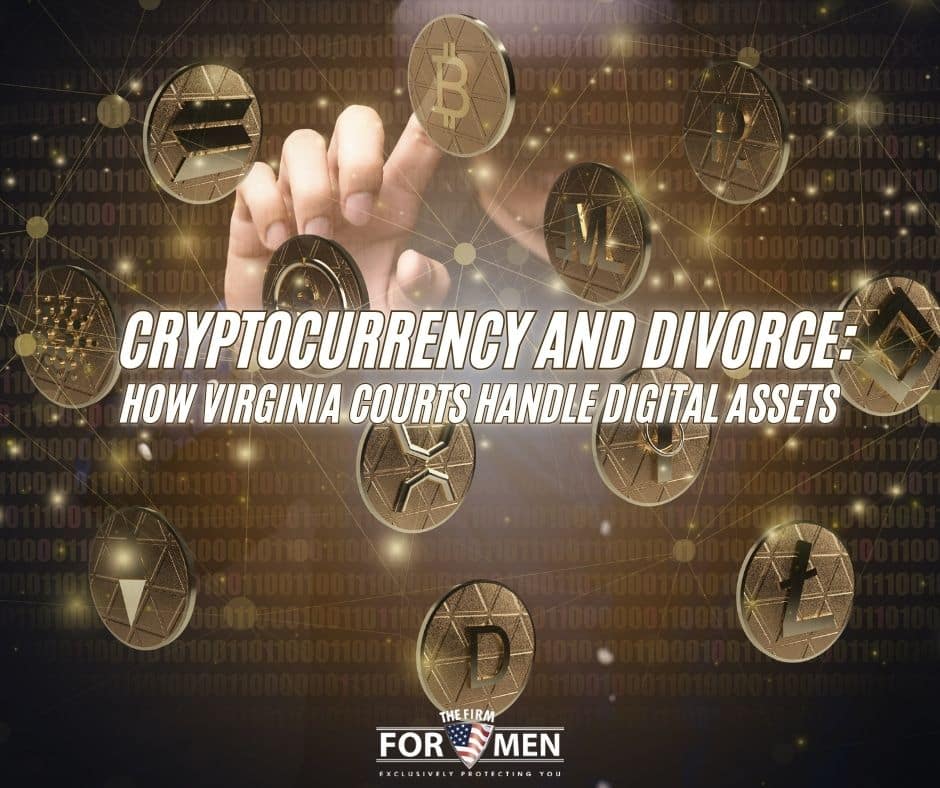Confederate paper money may be worthless as U.S. currency, yet collectors still pay hundreds of dollars for a Choice Uncirculated (CU) bill. In much the same way, cryptocurrency—first introduced in 2009 as a digital currency system—has become a valuable financial asset in modern life, and often, a key point of contention in Virginia divorce cases.
Jump to a Section
- Understanding Cryptocurrency in Divorce
- Digital Assets and Virginia Divorce Law
- Dividing Digital Assets in a Virginia Divorce
- How Virginia Courts Classify Digital Assets
- Maintaining Control and Reducing Conflict
- Trust Your Attorney — and Verify Everything
Understanding Cryptocurrency in Divorce
You may think cryptocurrency isn’t part of your financial picture—but it could be hidden among your investments, retirement accounts, or business dealings without your knowledge. Your spouse may also hold crypto assets as separate property, making it crucial to understand how these assets are valued and divided in a Virginia divorce.
According to Cornell Law School, there’s no single legal definition of cryptocurrency. Instead, the terms cryptocurrency, digital currency, cryptoassets, and digital assets are all considered subcategories of convertible virtual currency (CVC)—digital value that functions like, or can be exchanged for, traditional money.
Unlike paper cash or coins issued by a government, CVC is not legal tender. You can’t be forced to accept Bitcoin for rent, for example, but it still carries financial value—sometimes enormous.
Common cryptocurrencies and their year of origin include:
- Bitcoin (BTC) – 2009
- Dogecoin (DOGE) – 2013
- Ripple (XRP) – 2013
- Ethereum (ETH) – 2015
- Tether (USDT) – 2015
- Cardano (ADA) – 2017
- Tron (TRX) – 2017
- Solana (SOL) – 2020
The cryptocurrency market can be volatile—full of speculation, opportunity, and risk. Many failed ventures (like OneCoin and BitConnect) proved to be Ponzi schemes, while others continue to thrive as legitimate investments.
Digital Assets and Virginia Divorce Law
Cryptocurrency is just one type of digital asset. The IRS defines digital assets as “any digital representation of value recorded on a cryptographically secured, distributed ledger (blockchain) or similar technology.”
Under the Virginia Code, a digital asset is “an electronic record in which an individual has a right or interest.” Digital assets can include:
- Photos, artwork, and NFTs
- Emails, documents, and spreadsheets
- Logos, websites, and software
- Digital media, videos, and presentations
- Streaming service subscriptions and online accounts
In a Virginia divorce, digital assets are subject to equitable distribution—meaning they must be fairly (though not necessarily equally) divided between spouses.
Dividing Digital Assets in a Virginia Divorce
Low-value digital files such as photos, spreadsheets, and emails can often be duplicated and shared. However, high-value or unique assets—like NFTs, Bitcoin wallets, or intellectual property—require more careful handling.
Under Virginia Code § 20-107.3, divorcing couples can work with their family law attorneys to agree on how to divide both digital and tangible property. Key steps include:
- Creating an inventory of all digital assets
- Making a wish list of items meaningful to each spouse
- Understanding market volatility of crypto and NFTs
- Setting a valuation date to avoid disputes
- Hiring experts, such as forensic accountants or crypto specialists
- Including all holdings in the property settlement agreement
Even sentimental assets like social media accounts can carry financial value if tied to a business. Meanwhile, crypto values can fluctuate dramatically—impacting tax obligations and equitable division.
How Virginia Courts Classify Digital Assets
Virginia law places property into three main categories:
- Separate Property – Acquired before marriage or received as a gift/inheritance.
- Marital Property – Acquired jointly during the marriage.
- Hybrid (Commingled) Property – Assets that combine both.
Establishing a fixed valuation date helps minimize disputes over fluctuating crypto values and can reduce legal costs during divorce proceedings.
Maintaining Control and Reducing Conflict
The more agreements you and your spouse reach before going to court, the more control you maintain. Try to:
- Negotiate directly with your spouse when possible.
- Use your attorneys to finalize or mediate complex issues.
- Leave only the most contested matters for the Circuit Court judge.
Remember, once the matter reaches court, much of your decision-making power shifts to the judge—and the final outcome may not align with your personal or financial goals.
Trust Your Attorney — and Verify Everything
Digital assets and cryptocurrency fluctuate by the minute. In a Virginia divorce, your family law attorney plays a critical role in protecting your financial interests, uncovering hidden crypto holdings, and ensuring fair valuation.
Don’t let frustration lead to poor decisions. Work closely with your lawyer, document everything, and consider hiring digital asset experts to trace, value, and divide your holdings accurately.
Experienced Virginia Beach Divorce Attorneys for Men
At The Firm For Men, we have deep experience handling digital assets, cryptocurrency, and complex property division in Virginia separations and divorces. We understand how rapidly this financial landscape changes — and we know how to protect your rights within it.
Contact our Virginia Beach office today at (757) 383-9184 or fill out the form above to schedule a confidential consultation.
The Firm For Men — Defending Men’s Rights, Protecting Their Futures.

